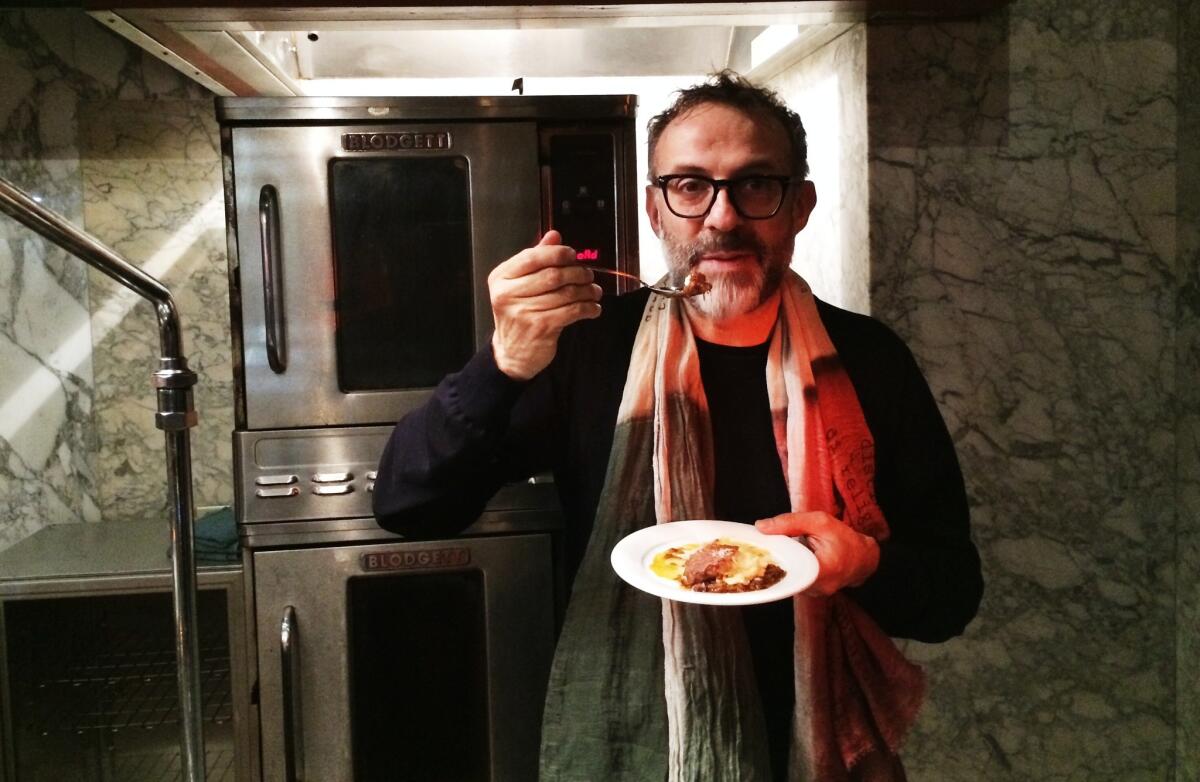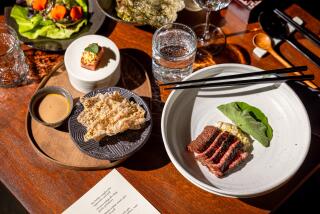The night Massimo Bottura met Chi Spacca

It was the culinary equivalent of the âOdd Coupleâ Tuesday night when the emphatically primitivist restaurant Chi Spacca hosted a book party for the emphatically modernist Italian chef Massimo Bottura. What was most interesting, though, was how both ultimately seemed to be on the same wavelength.
Chi Spacca is a space built on meat â cured, grilled, roasted, but undeniably still meat. Botturaâs restaurant, Osteria Francescana, and his just-published cookbook âNever Trust a Skinny Italian Chefâ take a decidedly more theoretical approach.
Typical is the dish Bottura calls La Dame et son Chevalier (The Crunchy Part of the Lasagna). It is made of four triangles -- two Parmigiano-Reggiano wafers, two of spinach pasta (first boiled and then baked until crisp) -- perched over spoonfuls of ragu and bechamel, with a long stripe of tomato terrine running down the side.
This kind of imagination has earned Osteria Francescana in Modena three Michelin stars and a ranking as one of the five best restaurants in the world. The book is a wonder â full of photos of food, setting and whimsy (though a close-up of a section of his record collection displays an unfortunate fondness for Dan Fogelberg).
But if youâre looking for recipes, theyâre going to be way in the back of the book, in tiny type. Instead, what you get are short essays on the philosophical and technical roots of each dish. Theyâre fascinating windows into the workings of one of cookingâs most creative minds.
And if youâre a chef used to making tomahawk pork chops â no matter how ungodly good they are â they can be a little intimidating.
âWhen I knew we were going to do this dinner, I spent about a month of wondering,â says Chi Spacca chef Chad Colby, who is loved for his house-cured salumi and 42-ounce bistecca Fiorentina. âI like to envision success, but what are we going to do with this? We want to respect what he does, but we have to stay true to ourselves, to our skill sets and to our flavor profiles.â
Colby settled on a menu of salumi and the restaurantâs famed focaccia di Recco, a Parmesan souffle served over ragu, and shredded roast pork shoulder. The only overt nod to Bottura was pastry chef Dahlia Narvaezâ take on the chefâs Oops, I Dropped the Lemon Tart â a deliberately spattered mixture of lemon gelato, tart crust and zabaglione.
âI figured weâd do best staying true to the flavors he grew up with. I think of it as our homage to Modena,â Colby says.
It turned out to be a brilliant choice. Because as theoretical and, yes, even wacky as Botturaâs food can be, itâs all rooted in a profound connection to a specific culture and set of flavors. He plays jokes on traditional dishes, but theyâre the kinds of jokes that can only be played by someone who understands and deeply loves the subject heâs ribbing.
What Bottura is offering is a distillation of classic cooking, the essential flavors turned on their sides and viewed from an unusual angle.
Of that deconstructed lasagna, Bottura says â Itâs like when you chew a Parmigiano Reggiano crust, it immediately takes you back to childhood. The crunchy lasagna crust ⌠thatâs when your grandmother would bring a big lasagna to the table and the first thing everybody would reach for would be the little burnt edges. Weâre trying to connect you back with that joy.
âWe need to have a sense of humor because we need to leave things a little imperfect. You have to keep a little space open in your life for poetry.
âOur lives are so full of obligation but if you donât keep a little sense of humor, how do you live? We need to be able to play jokes, to be ironic. There is joy in food.â
Are you a food geek? Follow me on Twitter: @russ_parsons1
More to Read
Eat your way across L.A.
Get our weekly Tasting Notes newsletter for reviews, news and more.
You may occasionally receive promotional content from the Los Angeles Times.











